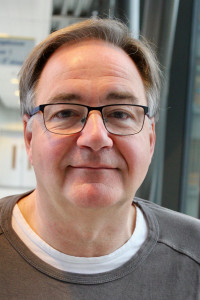Assistant Professor

I trained as a neurophysiologist and focused my research on the neurobiology of circadian clocks. The master circadian clock is situated in the hypothalamus and orchestrates the temporal order of all physiological processes in our body. It is not surprising that circadian clock disturbances are correlated to a host of diseases like sleep disorders, neurodegenerative diseases, metabolic syndrome, depression, cardiovascular diseases and even cancer. Our goal is to better understand clock mechanism and, by using intervention to restore function in compromised clocks like in the elderly, restore functional physiology. To achieve this goal I use my experience in ex vivo electrophysiology, imaging techniques and organotypic culture techniques. The brain slice preparation used in or laboratory allows for high quality electrophysiological recordings under controlled conditions. Together with work on cultured slices we obtain an extensive and in debt view of the cell- and membrane physiology of pacemaker neurons, their role in the neuronal network and their plasticity to challenges form the environment and in aging.
I obtained my PhD in 1989 at the University of Frankfurt (Germany) for work on neuronal coupling mechanism in the circadian system of scorpions. Subsequently, I moved to the University of Virginia (UVA) on a German Post-doc fellowship and worked in the laboratory of Gene Block on circadian modulation of ion channels in molluscan circadian clock cells. I was able to demonstrate that an isolated neuron is able to generate a 24h rhythm. With the establishment of the NSF center for Biological Rhythms I stayed until 1994 as a senior scientist at UVA. Then I moved to the University of Leipzig to establish my own group as a Research Associate of the Max Planck Institute and later as Assistant Professor at the University. After obtaining my Venia legendi in Leipzig, I moved in 2000 to the University of Los Angeles in California to work with Chris Colwell as a Research Assistant Physiologist on peptidergic modulation of clock function in rodents. This was not only my move to work with mammals, but also to work in a hospital as a neurophysiologist. Since 2004 I work with the group of Johanna Meijer on the mechanisms of synchronization in clock networks and the impact of aging on the clock.
Olde Engberink AHO, Meijer JH, Michel S.
Neuropharmacology; 138:80-86. doi: 10.1016/j.neuropharm.2018.05.023.
Farajnia S, van Westering TLE, Meijer JH, Michel S.
Proc Natl Acad Sci U S A, 111(26):9627-32.
Michel S, Geusz ME, Zaritzky JJ and GD Block
Science 259: 239-41



Looking for information on one of our topics, a new place to conduct your research or experienced research to join forces with? Feel free to contact us.!